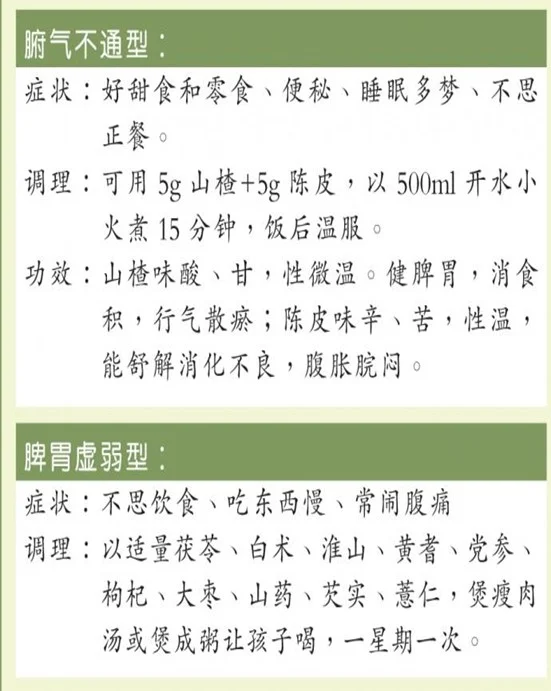Traditional-minded elders often hope that children grow up fat and strong. When they see children who are small and thin, they may believe that the parents haven’t fed them properly.
Indeed, some children may experience nutritional imbalances due to picky eating or eating snacks instead of regular meals. However, there are also many children who, regardless of how much they eat, remain slim and lacking in body fat. Therefore, elders often suggest that these children should be properly nourished. Additionally, some “competitive” parents, thinking that children must “win at the starting point,” give their children large amounts of supplements from an early age, forcing them to consume expensive herbs and medicinal foods, hoping to build a “good” constitution.
However, this approach is not correct. For children who already have sufficient nutrition, excessive supplementation can be counterproductive; while for those who are underweight and weak, supplementation should not be indiscriminate. The root cause of the problem must be identified and addressed accordingly.
Experienced pediatrician, Dr Alice Yee Siew Kein, states that before supplementing a child’s diet, parents must first check if the child’s weight meets normal standards. If the child is overweight, continuing supplementation may lead to premature development. If the weight is below standard, the factors should be examined, and targeted adjustments should be made.
How can one determine if a child’s weight is normal? Dr Alice Yee Siew Kein shares the following methods:
Childhood is divided into three stages:
Infancy (1-3 years)
Preschool (3-7 years)
Adolescence (7-12 years)
The formulas are as follows:
- For children aged 1 to 6 years: Age × 2 + 8 (For a 5-year-old child: 5 × 2 + 8 = 18. Standard weight is 18 kg)
- For children aged 7 to 12 years: Age × 7 – 5 ÷ 2 (For a 10-year-old child: 10 × 7 – 5 ÷ 2 = 32.5. Standard weight is 32.5 kg)
Dr Alice Yee Siew Kein points out that if a child’s weight exceeds the standard, and parents continue to supplement, early development may occur. If the child meets the conditions of “good appetite, good sleep quality, and regular bowel movements,” they do not need excessive supplementation.
When is supplementation necessary?
Dr Alice Yee Siew Kein often encounters parents who are concerned about their child’s frequent illness and weakness and ask how to supplement. Conversely, some parents are concerned because no matter how much nutritious food they give their child, the child doesn’t seem to grow stronger. What could be the cause of this?
She analyzes that the reasons for a child not growing stronger include:
- Inherited deficiencies (genetics)
- Lack of sleep
- Poor eating habits
- Environmental influences
- Lack of exercise
Avoid giving random supplements
Dr Alice Yee Siew Kein emphasizes that during normal growth, children will naturally experience a rise in Yang energy and bone steaming heat (heat radiating from the bones). Therefore, children who are growing normally do not need excessive supplementation if they have good digestion, a balanced diet, proper sleep, and sufficient exercise.
“If a child can’t grow stronger despite eating, the root cause must be identified. The best method is to consult a Traditional Chinese Medicine (TCM) practitioner for a diagnosis to determine the specific issue and the appropriate supplements. If the goal is simply to boost immunity and resist external pathogens, adjustments in diet and medicinal foods can be made. However, parents should avoid indiscriminately giving supplements such as ginseng or cordyceps. These should be handled by professionals, as general parents should not give random supplements.”
TCM treatment: Proper conditioning leads to results
What advice would a TCM practitioner give regarding supplementing a child?
Dr Alice Yee Siew Kein says: “In TCM, supplementation should still be based on syndrome differentiation. Treatment should match the syndrome. Excessive supplementation can lead to problems such as overly fast development or excessive weight gain.”
“From a TCM perspective, the reason a child cannot grow stronger despite eating may be due to dysfunction in the spleen, which is responsible for absorbing nutrients. If the spleen and stomach are not functioning well, there will be poor absorption, leading to weakness, bloating, and other digestive issues. After eating, the child may experience abdominal discomfort.”
Dietary adjustments to restore normal function
She explains that some children are born with weaker spleens and stomachs, which may manifest as pale skin, fatigue, drowsiness in class, frequent colds, or a long recovery from colds.
Even with these symptoms, the cause must be identified. For example, is the child picky with food? Does the child have a sweet tooth? Is there a lack of bowel movement habits?
“These issues are multifaceted. For instance, if a child has a pale complexion and prefers sweet foods over regular meals, the root cause is nutritional deficiency. Once the diet is adjusted, the child will slowly recover. The root cause must be identified, and once the correct treatment is applied, results can be seen quickly.”
Classification and treatment: Expelling wind and dispersing cold
Dr Alice Yee Siew Kein explains that children in need of treatment can be classified into two types: those with blocked Qi and those with weak spleen and stomach. Below, she also provides some examples of food therapy for reference:

Note: If a child is frequently irritable, has trouble sleeping, and tends to be constipated, it is best to avoid overly warming supplements such as Dangshen (Codonopsis) or Huangqi (Astragalus).
Strengthening and Health Maintenance
In addition to using food therapy and medicinal soups for supplementation, the following methods can also help strengthen a child’s body.
Child’s Spinal Pinching Technique
Method: Have the child lie face down. Apply some essential oil or baby oil to their back. Starting from the lower back, gently pinch and lift the skin along both sides of the spine about 1.5 inches apart using the fingers. Pinch, lift, and simultaneously push forward. You can do this for 10 to 15 minutes before the child goes to sleep.
Principle: The area 1.5 to 2 inches on either side of the spine is the pathway of the Bladder Meridian of the Taiyang channel, which is closely related to the internal organs. Pinching the spine helps stimulate nerve points along these channels. Doing this before bed will help the child sleep comfortably, promoting growth.
Outdoor Activities
Encourage children to engage in outdoor activities to stretch their muscles, bones, and get sunlight, which is essential for healthy growth.
Can children “supplement their form with form”?
Traditional Chinese wisdom suggests that one can “supplement form with form” or “supplement organs with organs,” such as eating pig brain to nourish the brain. Does this apply to children as well?
Dr Alice Yee Siew Kein points out that the belief in eating pig brain to improve brain health is common because pig brain contains many nutrients like calcium, phosphorus, and iron. However, it also contains high cholesterol. Therefore, it is not recommended for children due to the potential risk of raising cholesterol levels. Additionally, these minerals can be obtained from other foods. Furthermore, since pig brain comes from an animal, there could be growth hormones or additives used during farming, and it may not be processed hygienically, so Dr Alice does not encourage this practice.
Walnuts are a better substitute
In contrast, Dr Alice believes that walnuts are a better alternative. Nutritionally, walnuts contain beneficial oils that are great for brain development. Interestingly, the shape of a walnut resembles the structure of the brain, making it a more fitting food for the concept of “supplementing form with form.”
There is also a popular belief that drinking peanut root soup helps boys grow taller. Peanuts, also known as “longevity fruit,” have high nutritional value, especially the roots, which are richer in nutrients. This is often made into a soup with pork ribs. Dr Alice believes that peanut root soup can have some effect, but it should not be consumed excessively, as a child’s height and build are influenced by many factors.
Additionally, Dr Alice does not recommend giving children too much ginseng, angelica, cordyceps, or deer antler. “These blood-boosting herbs must be carefully selected and should not be used as a single supplement for children. They should only be used after a TCM diagnosis and targeted treatment, especially for weak or compromised lungs. These supplements should not be given during a cold or fever; they should only be used after recovery, combined with other treatments.”
Eat More Colorful Vegetables
In daily life, it’s important to ensure a balanced intake of carbohydrates, proteins, fiber, vitamins, and good fats. Additionally, it’s recommended to eat a variety of colorful vegetables, such as cauliflower, cabbage, Chinese yam, and radishes.
Are supplements suitable?
Dr Alice Yee Siew Kein states that supplements like vitamin C to boost immunity or Omega-3 to support brain health are fine when given in moderation. However, this doesn’t mean that every child will be able to absorb them. Children with weak spleens and stomachs may have difficulty absorbing these nutrients and may experience symptoms of heat.
“If a child sweats lightly from the neck while sleeping, this is a normal sign. Elders often believe that children grow during sleep, and as long as they sleep well and for long enough, they will grow tall. However, if the child sweats heavily, soaking their clothes during sleep, this is abnormal. At this time, giving too many supplements like vitamins, combined with insufficient water intake, may cause constipation or make the child more susceptible to illness.”
